If Confederate statues could vote, Corey Stewart would be a shoo-in for the Virginia GOP primary
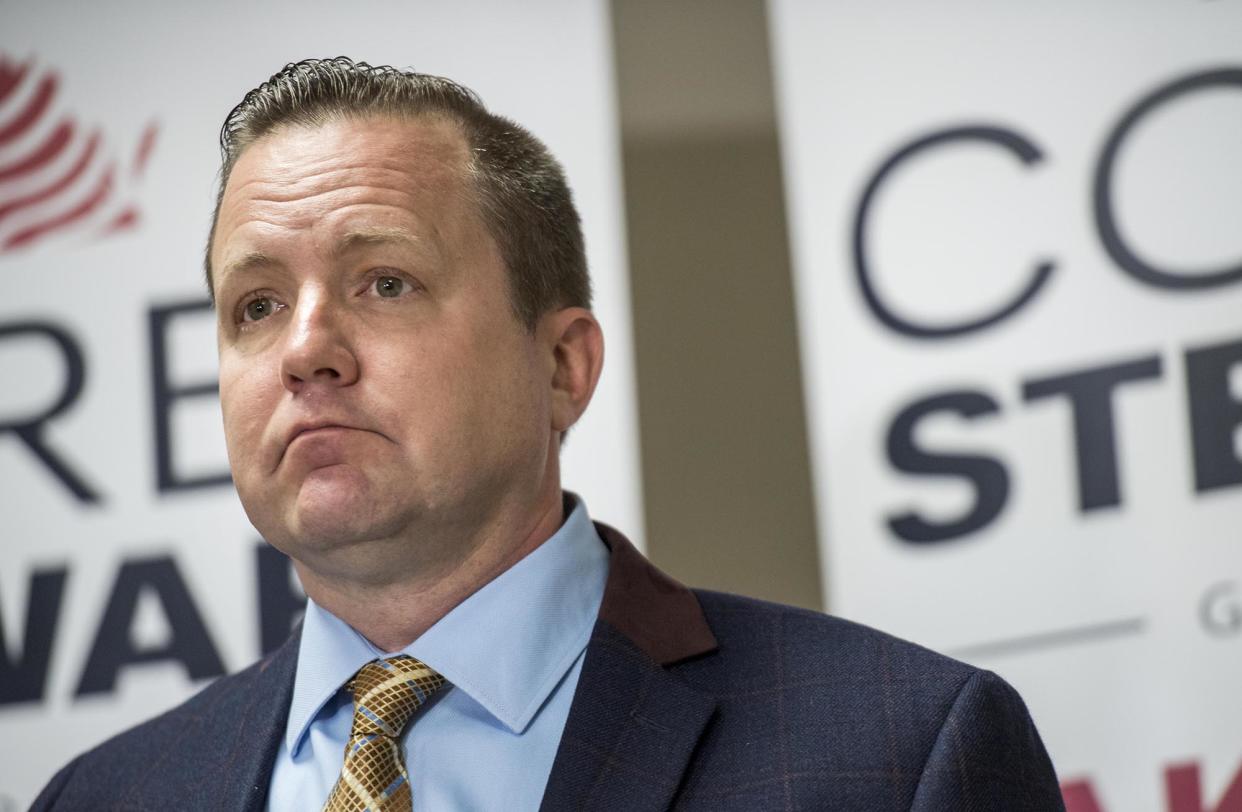
WOODBRIDGE, Va. — Corey Stewart, chairman of the Prince William County Board of Supervisors, wasn’t always a strident opponent of removing monuments considered racially insensitive to minorities.
But until this year, he wasn’t running in the Republican primary for governor of Virginia.
Just a year ago, Stewart spoke at a ceremony to celebrate the renaming of a middle school here. The county school board had removed the name of Mills Godwin, a two-time governor of Virginia who fought desegregation of the state’s schools in the 1950s as a state senator.
The school board renamed Godwin Middle School as George M. Hampton Middle School. The school’s new namesake, Hampton, is a long time community leader in Prince William County, a pioneering black officer in the newly integrated U.S. Army during the Korean War.
Stewart praised the name change at a ceremony at the school last August. “Good evening, Prince William County!” Stewart said to the audience as he began his remarks. “Are you excited to rename this school? It’s been a long, long, long time in coming, that’s for sure.”
Godwin, who died in 1999, never apologized for his racist actions, but he eventually did stop opposing desegregation. He campaigned for President Lyndon Johnson in 1964 — the same year that Johnson signed the Civil Rights Act into law — and was endorsed by the National Association for the Advancement of Colored People in his 1966 run for governor. Stewart could have cited those more moderate positions in defense of Godwin, but he didn’t.
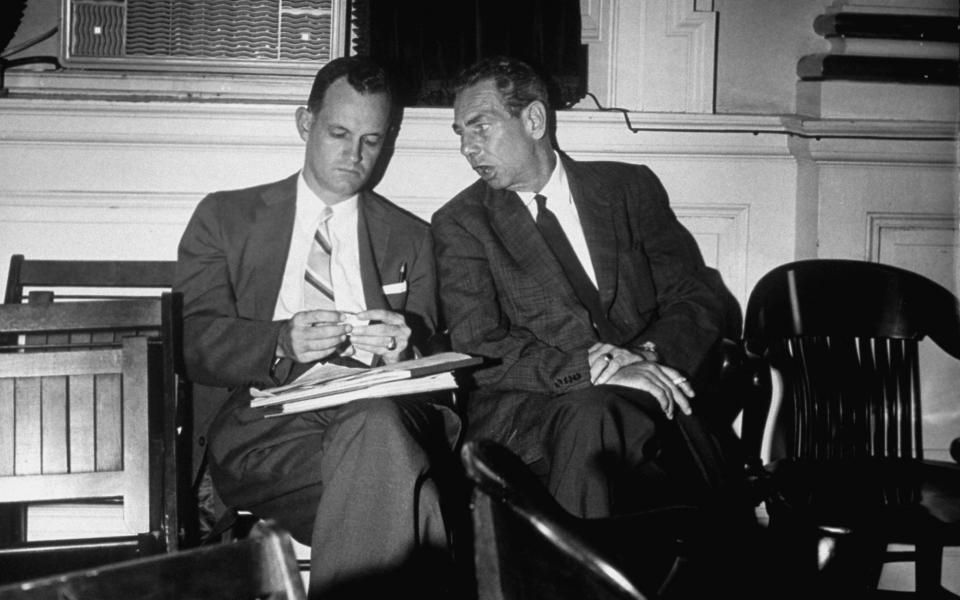
“As we move forward, Dr. Hampton’s name will live on as an inspiration to future generations, to the children who will graduate and attend here, and for all of us. Dr. Hampton, you’re a true American hero. Thank you for your service,” Stewart said.
Less than a year after his remarks at the school renaming ceremony, Stewart has made opposition to the removal of Confederate monuments a core issue of his own campaign for governor, which is lagging frontrunner Republican candidate Ed Gillespie as the June 13 primary approaches. At an event in his home county last week, Stewart spoke at length about the controversy that has erupted recently in places like New Orleans, where four Confederate statues or monuments were removed. Stewart argued that something deeper was afoot, a movement that threatened the nation’s foundation.
“If you can take down a statue of somebody who fought for the Confederacy because you would argue that the Confederacy stood for the preservation of slavery, then you can easily say we should take down any statue and any monument to any slaveholder. And that in Virginia, and that in America, means our founders: Jefferson, Madison and Washington,” Stewart said. “And when you take down the founders, you take down the founding documents. And that is what this is all about.”
Stewart didn’t explain his contention that such a process would undermine the Constitution. But he included an allusion to possible violence when expressing his resolve to fight those who want to take down monuments. “Over my dead body, when I am governor of the Commonwealth of Virginia, are we going to remove a single statue to any Virginian,” he said.
Asked by Yahoo News to reconcile that position with his approval of renaming the Godwin school, Stewart didn’t retract his remarks from last year, but put them in a very different light. In a statement emailed to Yahoo News by his campaign, he said: “Mills Godwin was a racist Democrat — quite distinct from the Founding Fathers or Gen. [Robert E.] Lee — so to decide to name a school after someone else is a far cry from the leftists’ destroying historical monuments and the erasing of all dissenting opinion.”
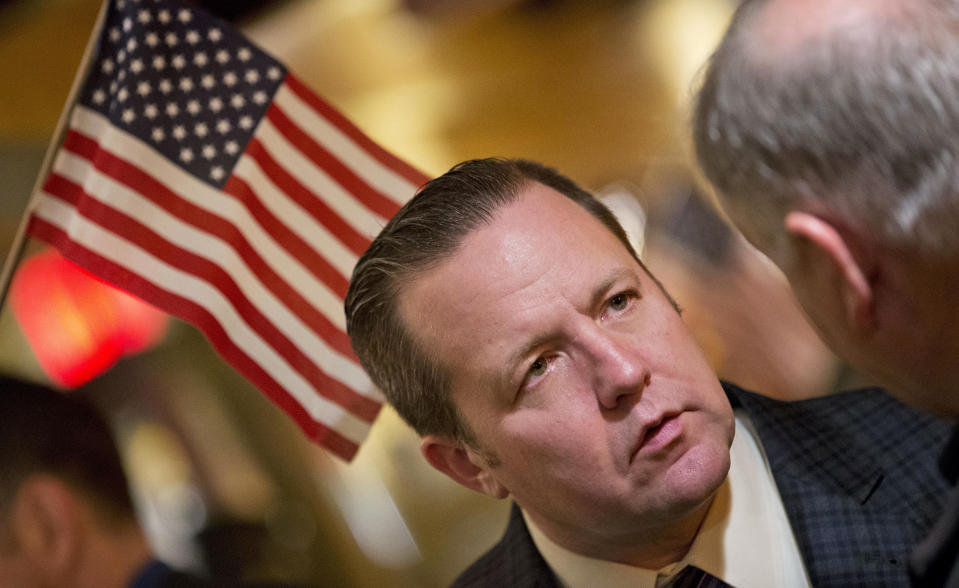
To voters, Stewart gave different reasons for opposing the removal of monuments and statues than he did to reporters. In an interview, Stewart said that monuments to Confederate leaders served as warnings about the mistakes of the past.
“You should never take a monument down, because at that point you’re trying to sanitize history. You’re trying to erase history. And history is not always pretty. We have monuments up to people who in some cases were not exactly great people. But when you try to take that down you’re taking a part of history down, and I think it has to stay there. Those monuments were erected for a reason so that people remember, and that was during a time when many civil war veterans were still alive, and their families. And they wanted to send a signal to future generations that there was a huge sacrifice here, and it’s something we should never repeat. And I think once you forget, you do repeat, and that concerns me,” he said.
But to his audience of 50 or 60 supporters on the back deck of a restaurant overlooking the Occoquan River, Stewart went in a different direction.
“If we allow them to destroy our history, to try to rewrite history, to sanitize history, we are losing part of our identity here in Virginia,” he said. He did not talk at all about the idea that statues could serve as warnings.
Related slideshow: The fall of the Confederacy >>>
And in fact, many Confederate monuments were erected during the post-Reconstruction era to “send a strong message to all who walked in their shadows about who was still in charge,” as New Orleans Mayor Mitch Landrieu said in a recent speech.
Stewart said he rejected the idea that Confederate statues could serve as reminders of past injustices if they were placed in a museum instead, taken from a place of honor to a place of analysis. “I don’t go for it,” Stewart said. “Very few people actually go to museums and look at stuff like that.”
Stewart first took interest in the monuments issue in February when he staged a protest at a statue of Robert E. Lee in Charlottesville, where the city council voted to remove the statue. A Charlottesville circuit court judge issued a six-month injunction to delay this action in early May. And white nationalist Richard Spencer held a torchlight rally at the Lee statue in early May, where he and a few dozen others chanted, “You will not replace us!” and “Russia is our friend!” The torches evoked memories of Ku Klux Klan rallies and cross burnings.
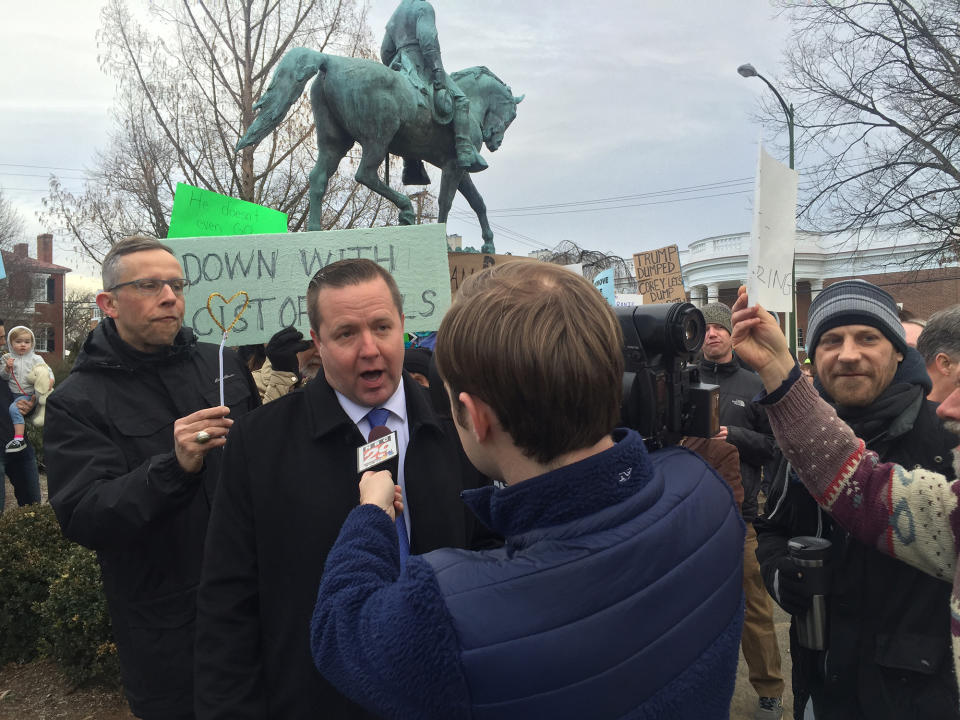
Gillespie, Stewart’s chief opponent in the Republican primary, condemned the torchlight rally.
“The ugly display of divisive rhetoric and intimidation tactics in Charlottesville yesterday does not reflect the thoughtfulness and tolerance I see in my fellow Virginians everywhere I go,” Gillespie said on Twitter.
Gillespie held a commanding lead over Stewart and a third Republican candidate, Frank Wagner, in a recent Washington Post poll of likely voters, with 38 percent to Stewart’s 18 percent and Wagner’s 15 percent. It’s an indication that Stewart’s approach to the governor’s race, to try to provoke outrage similar to the ways Donald Trump did during the 2016 presidential campaign, has not worked. It’s cost him endorsements from close allies even in his own county.
Stewart put no stock in the idea that his colleagues in government might have insight into his qualifications for elected office. “I have only one endorsement that I care about and that is the vote of every citizen in this county. I don’t go around asking for the endorsements of other politicians. I really don’t care. I don’t care. I never have. I’ve never done that. I’ve never run a campaign by saying, Hey vote for me because I’m endorsed by so and so. I’ve always run on my own record and that’s what I’m doing now,” he told reporters at the marina event.
And with just over a week now until the primary, Stewart has resorted to even more inflammatory rhetoric and stunts. He accused Gillespie of being “complicit in human trafficking” because his lobbying and consulting firm was retained by Tyson Foods over a decade ago. Federal prosecutors in Tennessee brought an indictment against Tyson Foods in 2001 for arranging to have undocumented immigrants brought into the U.S. to work for the company, but a jury acquitted Tyson of the charges in 2003.
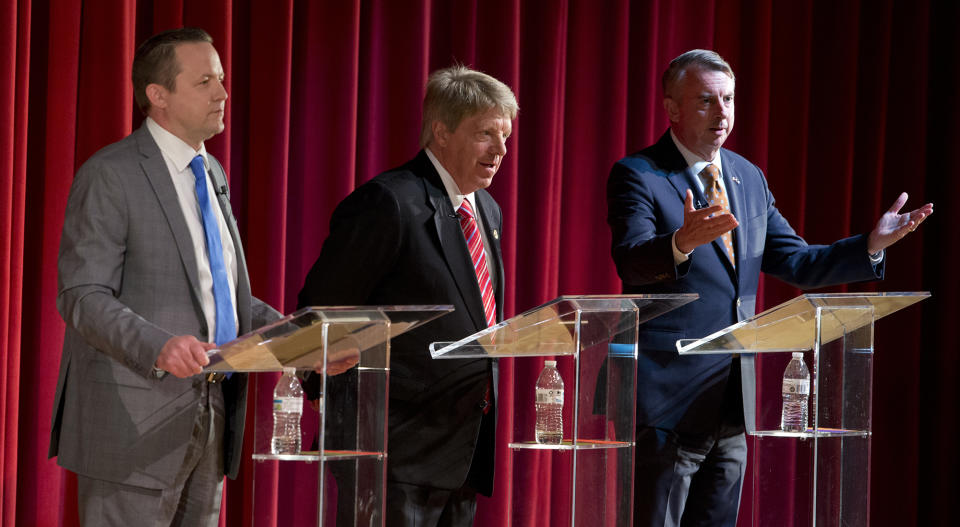
At the marina event, Stewart played fast and loose with the facts on the matter. “He was paid $1 million by Tyson Foods to lobby for amnesty and to downplay charges, to help them out for the indictment for human trafficking and to downplay those charges. And in fact he got them off,” Stewart said.
When asked if he thinks Gillespie is a “bad person,” Stewart said, “Yeah, I do. I think anybody who would help a corporation smuggle people into this country, so that those people are exploited, they’re forced to work for almost nothing. … He’s made a lot of money off of that. And I find that morally reprehensible,” he said.
Gillespie has said he did not work on the Tyson criminal case, and a Gillespie spokeswoman told the Washington Post that Stewart’s campaign has been “a constant stream of fabrication and falsehoods.”
Stewart likes to say he was “Trump before Trump was Trump,” and he was even fired from the Trump campaign last fall after staging a protest in front of the Republican National Committee for not supporting Trump wholeheartedly enough. He has been a loud voice for cracking down on immigration in his role as chairman of the board of supervisors over the last decade.
But if Stewart loses to Gillespie, it will show the limits of running a campaign for statewide office using the same tactics that helped Trump win the presidency.
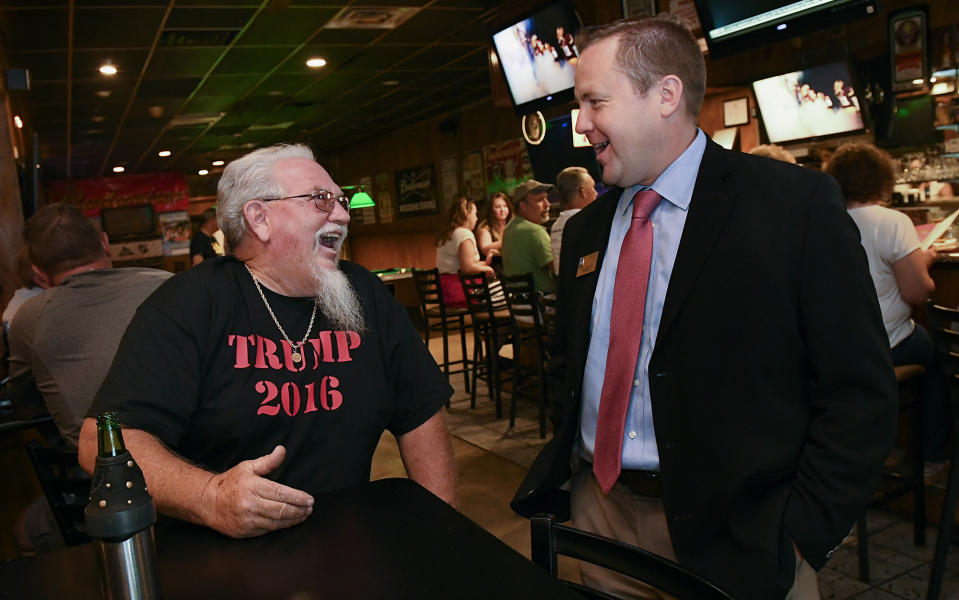
_____
Read more from Yahoo News:
How the Trump administration’s secret efforts to ease the Russian sanctions fell short
White House officials struggle to answer questions about Trump’s withdrawal from Paris accord
Pittsburgh mayor fires back after Trump invokes Steel City in climate announcement
Photos: Just a 100 miles from the White House, Tangier Island is disappearing into the sea



